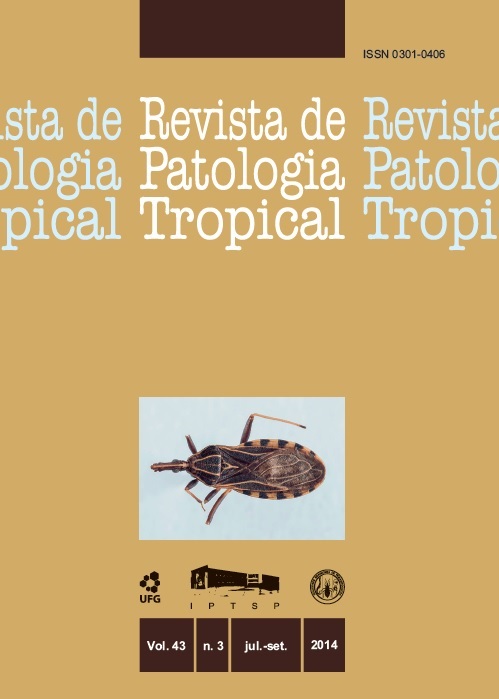FIRST RECORD OF RHODNIUS DOMESTICUS NEIVA & PINTO, 1923 (HEMIPTERA: REDUVIDAE) IN THE AÇUCENA MUNICIPALITY, MINAS GERAIS, BRAZIL.
DOI:
https://doi.org/10.5216/rpt.v43i3.32205Keywords:
Açucena, triatominae, Rhodnius domesticus.Abstract
Triatomineos are vector insects from Tripanosoma cruzi, the main insect in causing Chagas’s Disease. In August 2013, professional from the Regional Health Superintendence of Coronel Fabriciano, Minas Gerais, registered the arrival of a Triatomine female identified as Rhodnius prolixus. The insect originated from a domestic residence of the people from Caeté, Açucena municipality. In order to confirm its identity, the insect was sent to the Research Center René Rachou (CPqRR/FIOCRUZ). In the identification of the triatominae, they used taxonomic keys and external morphology of the female genitals, allowing the insect to be identified as Rhodnius domesticus. The differentiating features in relation to other species were: the size of 15.5 mm, the brownish-yellow colour with chestnut brown in parts, absence of the spotted or speckled aspect, short head and non-curled feet. As well as this, the female genitals, in dorsal view, presented a moon shaped line dividing the ninth and tenth segment, and in ventral perspective presented the ninth segment finishing slightly below the tenth. The sample was stored in the collection of Chagas’s disease vectors (Fiocruz- COLVEC) do CPqRR/FIOCRUZ. It was the first time that this species was earmarked in the region. It’s important that entomology vigilance service is aware of the presence of the rare triatomines and process their identification correctly. In this way, entomologic collections and reference services have an important role, ensuring a quality service in identification.
Downloads
Downloads
Published
How to Cite
Issue
Section
License
The manuscript submission must be accompanied by a letter signed by all authors stating the full name and email address, confirming that the material has not been published or is under consideration for publication elsewhere, and agreeing to transfer copyright in all media and formats for Journal of Tropical Pathology. The authors will not be paid for published articles. They are solely responsible for the content of those articles, even if the Editor holds the right to adjust them to the norms of the journal.
The reviewers will not be paid for the peer review process.

